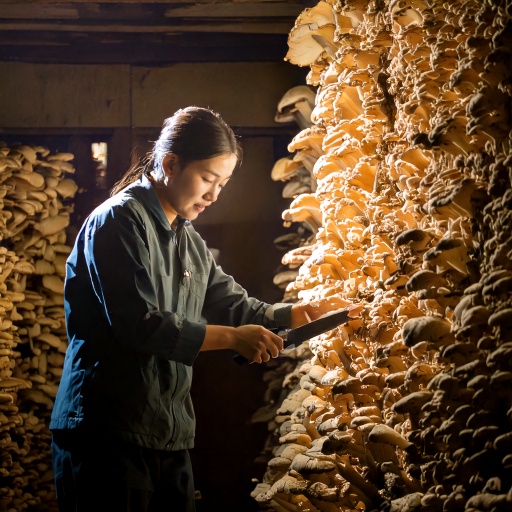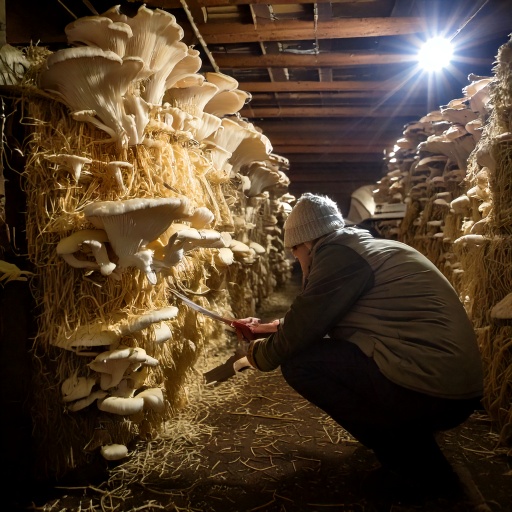Mycelium & Mushroom Cultivation: Converting Biomass to High-Value Cash Flow
The Ecoladang Mycelium & Mushroom Cultivation unit serves a dual strategic purpose:
- It transforms low-value fibrous biomass (such as palm fronds or bamboo) into high-value specialty crops.
- It produces the critical spent substrate needed as zero-cost feedstock for the on-site Insect Farming unit.
This micro-farm is designed for Controlled Environment Agriculture (CEA), guaranteeing reliable, year-round yields of gourmet and medicinal mushrooms, ensuring predictable and stable cash flow for the franchise partner.
1. The Zero-Waste Circular Substrate
The foundation of our unit’s profitability is the ability to turn agricultural waste from a liability into the primary growing medium. This approach eliminates the need for costly commercial substrates, maximizing initial margins.
Substrate Security and Cost Elimination
- Biomass Utilization: We utilize abundant fibrous waste from the surrounding environment (processed palm fronds, bamboo biomass) as a low-cost, readily available nutrient source for mycelium growth.
- Full Circular Integration:Once the mushroom block has fully fruited, the resulting spent substrate is a highly nutritious and critical input for the Insect Farm, completely eliminating the cost of insect feed and closing the economic loop.
Sustainable Operations
The unit's primary energy demands (climate control) are fully met by the clean, stable power generated from the on-site Biomass & Energy Services pillar, and precise humidity and irrigation control minimize water use and runoff.

Our strategy avoids low-margin commodity mushrooms. We focus exclusively on high-demand, high-margin specialty varieties with guaranteed market acceptance and access to premium pricing.
- Gourmet Varieties: We focus on market favorites like Oyster, Shiitake, and Lion's Mane. Lion's Mane is especially high-demand for health supplements, ensuring premium pricing in culinary and export markets.
- Medicinal Focus:We provide protocols for cultivating strains used in the nutraceutical and traditional medicine markets (e.g., Reishi), tapping into high-growth health and wellness sectors.
The sealed, climate-controlled environment provides guaranteed, year-round harvest cycles, removing seasonality and providing a reliable inventory stream for supply chain commitments. We include SOPs for immediate, on-site processing and specialized packaging that meets export quality standards.

Operational success relies on precision monitoring and immediate climate response. The Private Compact Data Space (PCDS)provides the central intelligence required to manage the highly sensitive growing environment.
Precision Agriculture
- CEA Control:Purpose-built grow rooms maintain precise control over temperature, humidity, and CO2 levels—critical factors for maximizing fruiting and minimizing contamination.
- PCDS Monitoring:Sensors within the grow rooms feed real-time data to the PCDS core. AI models use this data to predict environmental shifts, flag maintenance needs, and ensure continuous environmental optimization.
- Contamination Protocols: Detailed SOPs focus heavily on sterilization and block inoculation, which are the most critical factors for yield preservation in mushroom farming.
- Vertical Scaling:The unit is designed for vertical rack scaling, maximizing production per square meter of footprint, allowing for easy, land-independent expansion as market demand grows.
Where did your Mushroom come from?
TL:DR: - Ever wondered where that tasty Mushroom you are…
Fungi vs Mushrooms: What’s the Real Difference? (And Why It Matters for Your Plate!)
TL:DR: - Fungi are the entire kingdom of amazing organisms—think…
Learning about mushrooms in Malaysia.
learning about mushrooms in Malaysia with Friends of Fungi &…
Core Infrastructure
The entire gasification unit is integrated with the PCDS (Pillar 2) where the AI models and software services optimize feedstock rates, gas quality, and power output in real-time. This digital integration maximizes fuel conversion efficiency and ensures stable 400V power delivery precisely when and where it is needed.
The next stage in this pillar, Biomass Carbonization, takes the solid output from this process and turns it into our first high-value commercial and agricultural product. Do you want to review and expand that page next?